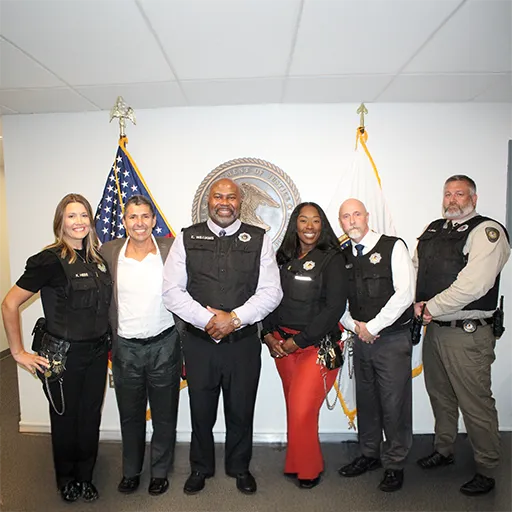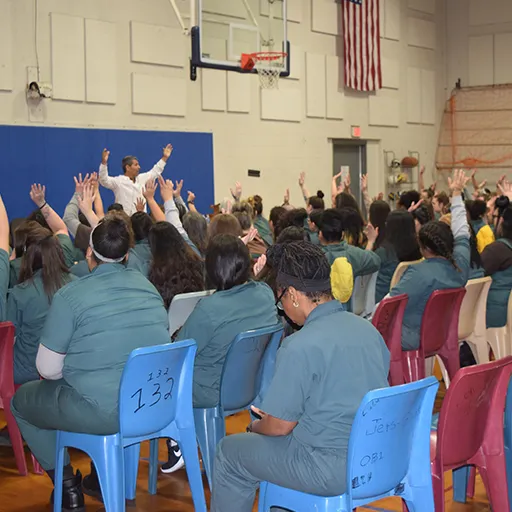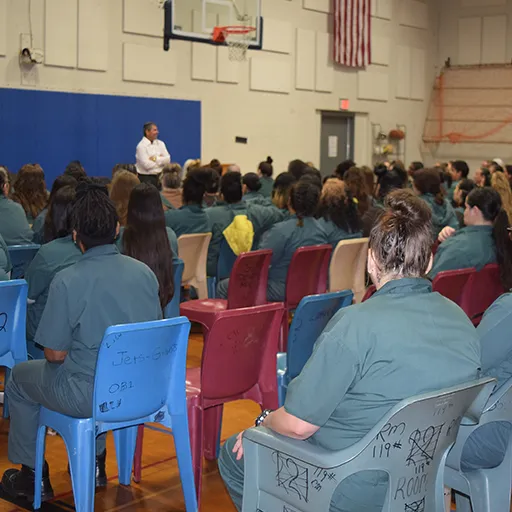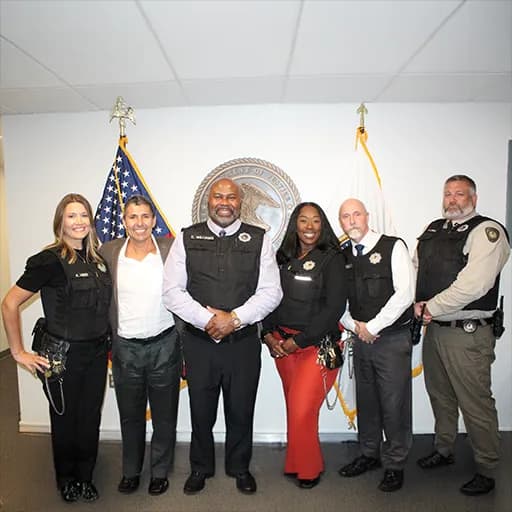
At 6:00 am, on Tuesday morning, Senior Deputy Regional Director Eric Williams texted to let me know that we’d be heading to FCI Waseca in time for our first meeting at 7:30 a.m. I was ready—energized and grateful for another opportunity to share an inspiring message with the women serving sentences there.
I had visited FCI Waseca several years ago. At that time, Warden Segal and Associate Warden McIntosh welcomed me. They’ve since moved on to the next phase of their journey, and I looked forward to meeting the new leadership team at FCI Waseca, feeling hopeful that Prison Professors could bring a positive influence to the people serving sentences there, and also confident that our programs could contribute to the institution’s culture.
I considered it a privilege and meaningful to travel alongside Senior Deputy Regional Director Eric Williams. He is a humble person who downplays the significance of his title, but I am grateful for the time we spent together, because it opened opportunities for me to listen and learn. He radiates authentic care for his team, greeting every staff member with warm hugs and genuine respect. When he introduced me, he didn’t describe me as a former inmate. Instead, he presented me as a colleague—a partner working independently to advance reforms that would allow more people in custody to earn freedom through merit.
That gesture spoke volumes about his leadership and character. It also advanced possibilities for our programs and advocacy to succeed.
A Warm Welcome from the Leadership Team
When we entered the institution, Executive Assistant Kirsten Hess welcomed us with professionalism and kindness. After we cleared security, she guided us to a conference room where I got to meet Acting Warden Lance Molis, Associate Warden LaKesha Davis, and Captain Joseph Koch. Those members of the leadership team offered their full support. As I described the mission of Prison Professors Charitable Corporation and our ongoing efforts to build a national culture of self-directed reentry preparation, they asked thoughtful questions, showing sincere interest. For example, they were curious about how our dashboards worked, and how we assigned points to measure progress.
What impressed me most was their proactive support—they had already promoted the program before my arrival. Kirsten told me that I’d be speaking to roughly 500 women in three separate sessions.

Three Sessions of Hope and Purpose
We moved to the gymnasium, where the leadership team had thoughtfully set up a microphone and sound system so my voice would carry throughout the large room. The women looked forward to hearing something new, and their enthusiasm inspired me.
Each presentation lasted about two hours, including a robust Q and A. I spoke about the importance of pursuing a self-directed reentry plan—taking ownership of time inside and transforming it into opportunity. I pledged that our team at Prison Professors would support every participant with free books, access to our digital platform, and guidance on how to memorialize their pursuit of excellence.
Our message was simple:
“Become extraordinary and compelling.”
It’s a phrase that appears often in our nation’s legal and reform literature, yet few define what it truly means. I challenged each woman to define excellence for herself—to set a clear vision for what success looks like after release, and to work each day toward that goal. Our books and courses would prompt them to focus on personal development and preparation for success, so they could return to society with confidence, and pathways to a contributing life.

Defining Excellence: The CEO of Your Life
I shared how that mindset—seeing myself as the CEO of my own life—helped me persevere through 26 years in prison. The strategy begins with values, continues with daily discipline, and leads to self-mastery.
I told the women that each of them has the power to rebuild, to redirect, and to rise above the circumstances of confinement. By documenting progress—through journaling, book reports, and release plans—they strengthen both their personal growth and the larger advocacy movement for reform.
A Growing Movement for Change
The extraordinary women in Waseca listened intently, took notes, and asked thoughtful questions about how to enroll and participate. By the time we left, our enrollments had grown to more than 2,600 active participants—a powerful indicator that this message is resonating inside federal institutions nationwide.
Our goal remains clear:
To help people in prison strive to become extraordinary and compelling, to document their transformation, and to build measurable data that can support earned-freedom reforms.
I’m deeply grateful to the leadership team at FCI Waseca, and to Senior Deputy Regional Director Eric Williams for accompanying me on the visit. Through teamwork and shared commitment, we’re helping thousands of people inside prison recognize their worth, rebuild their lives, and prepare to contribute meaningfully to society. We’re also building a database to show how people inside can become extraordinary and compelling, not only by lowering disciplinary infractions, but also by documenting records that advance their candidacy for the highest level of liberty, at the soonest possible time.

